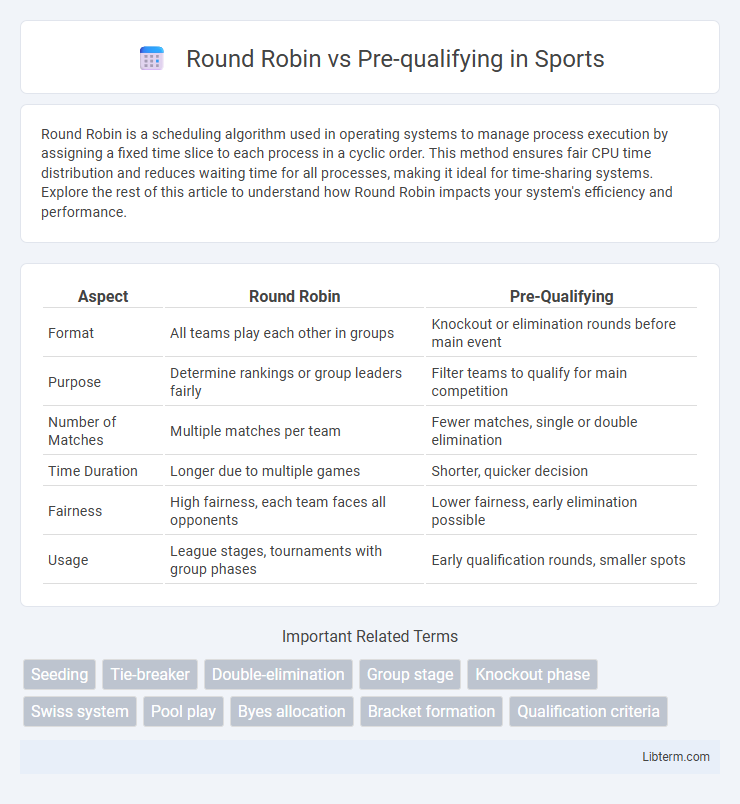Round Robin is a scheduling algorithm used in operating systems to manage process execution by assigning a fixed time slice to each process in a cyclic order. This method ensures fair CPU time distribution and reduces waiting time for all processes, making it ideal for time-sharing systems. Explore the rest of this article to understand how Round Robin impacts your system's efficiency and performance.
Table of Comparison
| Aspect | Round Robin | Pre-Qualifying |
|---|---|---|
| Format | All teams play each other in groups | Knockout or elimination rounds before main event |
| Purpose | Determine rankings or group leaders fairly | Filter teams to qualify for main competition |
| Number of Matches | Multiple matches per team | Fewer matches, single or double elimination |
| Time Duration | Longer due to multiple games | Shorter, quicker decision |
| Fairness | High fairness, each team faces all opponents | Lower fairness, early elimination possible |
| Usage | League stages, tournaments with group phases | Early qualification rounds, smaller spots |
Introduction to Tournament Formats
Round Robin format ensures every participant competes against all others, providing a comprehensive assessment of skills and consistent playing opportunities. Pre-qualifying involves initial elimination rounds that filter competitors before the main event, emphasizing efficiency in narrowing the field. Understanding these tournament formats is essential for organizers aiming to balance fairness, time constraints, and competitive intensity.
Defining Round Robin Structure
Round Robin structure involves each participant competing against every other participant in a group, ensuring comprehensive matchup exposure and balanced competition. This format contrasts with Pre-qualifying, where participants face a knockout or qualifying round to earn entry into the main event. Defining Round Robin emphasizes equal opportunity and consistent evaluation of all competitors through multiple games or matches.
Understanding Pre-qualifying Stages
Pre-qualifying stages filter participants early in competitions or recruitment processes to ensure only the most qualified candidates advance, improving overall efficiency. Unlike round robin formats where each participant competes against all others, pre-qualifying limits the field by assessing key criteria before the main event. This approach reduces time and resource expenditure by focusing on high-potential individuals or teams that meet predefined standards.
Key Differences Between Round Robin and Pre-qualifying
Round Robin tournaments guarantee each participant competes against all other players, ensuring comprehensive match exposure and point accumulation opportunities. Pre-qualifying is a preliminary elimination stage where players must win matches to advance to the main event, emphasizing performance under pressure and limited chances. Round Robin promotes consistency and balanced competition, while Pre-qualifying prioritizes high-stakes progression and immediate results.
Advantages of Round Robin Format
The Round Robin format ensures each participant competes against all others, maximizing play opportunities and providing a comprehensive assessment of skill levels. This structure reduces the impact of a single loss, promoting fairness and better ranking accuracy by allowing consistent performance to shine through. Round Robin tournaments also increase spectator engagement by offering more matches and continuous competition throughout the event.
Advantages of Pre-qualifying Format
Pre-qualifying format improves tournament efficiency by filtering participants based on skill level, ensuring higher-quality matchups in the main event. It reduces scheduling congestion and resource allocation by limiting the number of competitors advancing, leading to better-managed events. This format enhances viewer engagement through more competitive games and increases fairness by giving all players a clear opportunity to qualify based on performance metrics.
Disadvantages of Each Format
Round Robin format disadvantages include prolonged tournament duration and increased player fatigue due to multiple matches against all opponents. Pre-qualifying competitions can limit exposure and opportunities for lower-ranked players, often resulting in less competitive diversity and potential underrepresentation of emerging talent. Both formats pose challenges in balancing fairness, scheduling efficiency, and player performance consistency.
Use Cases in Different Sports and Events
Round Robin is ideal for sports like tennis and badminton, where each player or team competes against all others to ensure balanced competition and accurate ranking. Pre-qualifying is commonly used in events such as golf and athletics, where preliminary rounds filter participants to manage large numbers and maintain high skill levels in the main competition. Choosing between Round Robin and Pre-qualifying depends on factors like event size, scheduling constraints, and the importance of comprehensive versus selective competition formats.
Impact on Player Performance and Fairness
Round Robin format allows players to compete against all opponents, promoting consistent performance evaluation and reducing the influence of a single loss on overall standings. Pre-qualifying, often a knockout style, increases pressure by eliminating players early, potentially skewing fairness due to the higher chance of upsets and limited match play. Round Robin enhances fairness and performance measurement by providing multiple opportunities, while Pre-qualifying emphasizes immediate results but risks inconsistency in player advancement.
Choosing the Optimal Format for Competitions
Choosing the optimal competition format involves evaluating Round Robin and Pre-qualifying based on fairness, time constraints, and participant engagement. Round Robin ensures each player competes against all others, maximizing fairness and comprehensive assessment but requiring more time. Pre-qualifying filters participants quickly, saving time and resources while prioritizing higher-stakes matches, ideal for large tournaments with tight schedules.
Round Robin Infographic

 libterm.com
libterm.com